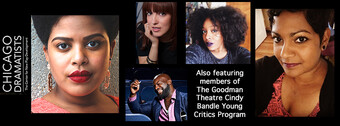On Diversity Hiring
Choosing the “Best” Person for the Job
In 2015, Haven Theatre Company in Chicago, IL launched a program called the Director's Haven, giving three directors at the earliest stages of their careers space to showcase their vision for the Chicago community. The program continued with its second cohort in the fall of 2016. Here, each of these artists to share their observations, experiences, and perspectives from their vantage points as directors at the very start of their professional journeys.—Josh Sobel, Artistic Director of Haven Theatre
“Do you think it’s easier for you to get work because you’re Asian?”
I’d graduated from college just a few months before, holding an embarrassingly sparse artistic resume for someone who wanted to work in professional theatre. Clueless about how anybody booked artistic work in Chicago, I was volunteering my time at an unpaid theatre internship in the hopes of some distant, unspecified payoff.
So I replied, “No.”
When people ask this question, what they’re really saying is that they feel entitled to what I have—that they want my opportunities and successes for themselves.
But in the following months, I found myself frequently going back to that very question.
I thought about it while reading interviews with casting directors, who discussed the difficulties of choosing between the most talented person for the job and the appropriate person for the job—as though those two ideas are mutually exclusive.
I thought about it at my next internship, even as I felt sadder and lonelier working in an industry where nobody talked like me and only a few would talk to me, until I confronted my supervisor in a show of ill-advised impertinence: “Did you pick me just because I’m Asian?”
And I thought about it when I was offered the Director’s Haven opportunity.
To be really noticed, minority artists must excel at their work. Those who don’t excel to the same extent are often perceived as having been booked solely because the hiring people wanted some diversity. Admittedly, industry leaders rarely actually approach this with ill intentions. It’s commendable that they are more committed than ever to showcasing lesser-known perspectives that would otherwise be excluded from mainstream narratives.
But I still wanted to prove that I also deserved the opportunities I was getting.
Prior to the Director’s Haven, I had assembled exactly zero directing credits with any organization reputed to produce so-called “real” theatre. At my alma mater, my directing work was solely backed by the Singaporean and Malaysian Students’ Union on campus, which consequently meant that it was regarded as a “culture show” (not to be confused with “real” theatre). So when the Director’s Haven opportunity came knocking, I realized how inextricably my ambitions and, yes, insecurities remained linked to achieving the kind of mainstream success I’d been exposed to all my life.
At the end of the day, I still wanted to be taken seriously as an artist by white America.
The Director’s Haven was the first time an American theatrical institution had expressed any sort of interest in my work as a director. Accordingly, I developed a misguided belief that it would be my only chance to prove that my work deserved a “legitimate” artistic platform.
As if this self-imposed pressure wasn’t bad enough, I had also pitched an ostensibly unproducible play by non-Equity standards. Domestic Departure required four actors of Asian descent, one of whom was in her sixties, and all of whom needed to speak Singlish well.

In fact, after learning about my play choice, one industry leader cautioned, “If this is going to be the first time you’re putting up work in this city, maybe you should save the play for a bigger theatre with the resources to do it the way you want.”
Reckless and inexperienced, I stuck by my play choice. I believed that this was exactly the sort of opportunity that needed to exist for Asian-American artists at the earliest points in their career. And I wanted to demonstrate that this type of show could be done, and done well—even at the beginning levels.
Because I’d convinced myself that failure was not an option, I felt like I couldn’t afford to take risks. But artists are most successful when they are willing to risk failure.
If the director sets the tone of a production, then it should come as no surprise that Domestic Departure was held back by its director’s personal fears and expectations. When somebody pointed out that my play was the program’s diversity play, I realized that I’d ironically fallen into the very trap I’d been so obsessed with avoiding.
One month after the Director’s Haven closed, the artistic director of a different theatre contacted me. For his next project, he needed a dramaturg of Asian descent. Aside from two pages of research for a staged reading, I had never before done any dramaturgy. In fact, I didn’t even really know what dramaturgs did (based on my acting experience in college, I assumed that they wrote informational packets which nobody read).
I asked him how he’d heard of me. “I saw your name in the Director’s Haven lineup,” he said. “I’m sorry I didn’t manage to see your show, though.”
Here was a person offering me a position I had no experience in or understanding of—and not because he had seen any of my work before.
Is it really easier for me to get work because I’m Asian?
Maybe it is true that, despite all the opportunities I’ve lost because of how I look and sound, I’m still going to benefit from occupying a very specific and underrepresented niche within the industry.
All the same, when people ask this question, what they’re really saying is that they feel entitled to what I have—that they want my opportunities and successes for themselves.
Except they don’t want the part where everyone questions my ability to speak English fluently. They don’t want the part where people avoid socializing with someone who is so culturally divorced from the familiar. They don’t want any of the heartbreak or loneliness that also accompany my identity.
In short, they don’t want the experiences that have informed my perspective.
Unfortunately, it all comes as a package deal.
So yes, I do get work because I’m Asian—but then it’s up to me to show that it’s not just because I’m Asian. And that’s why I don’t know if I’d describe it as easier.
“That’s fine. I’d love to do the dramaturgy,” I said. “I’m really excited to work with you.”













Comments
The article is just the start of the conversation—we want to know what you think about this subject, too! HowlRound is a space for knowledge-sharing, and we welcome spirited, thoughtful, and on-topic dialogue. Find our full comments policy here
You want the truth?
You should take every opportunity you can get and practice not caring what other people think. I really mean this, earnestly: It doesn't matter what they think. Take it all and make it yours and practice not caring. You are not a victim.
Thanks for this article and perspective. Such a complex question and clearly a complex answer as well, for you personally, and for all of us I think. I am glad to read your perspective. I wonder about another question often, as someone who has an intercultural theater company. And that is, how to communicate clearly and without hesitation, that the diverse actors I work with ARE the best actors for the roles I put them in. Not a single actor of color or actor from origins that are not Anglo-european, has been less than any talented and disciplined actor who brings their art to my direction and to the script. I have no more "disappointments" or "attitudes" or challenges with these actors than I do from more traditional casts. I adamantly stand in the place where someone's ethnic, cultural, religious, orientation, gender, or any other aspect of their humanness no more determines their skills and gifts than if they have their wisdom teeth or not. Although, I do thoroughly believe that everyone's individuality, including all these aspects of our identity, enriches and defines their perspectives and what they bring to the table as people. Their's are points of view and experiences that can only enriches what my company brings to the stage.